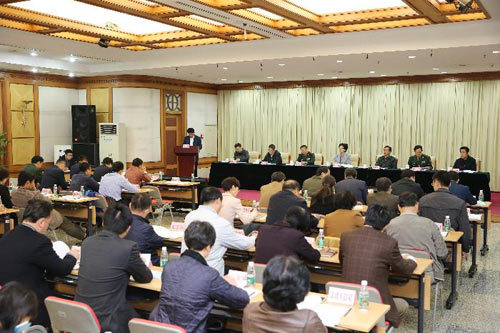Six government departments hold meeting to review special program on fighting illegal practice of medicine
The NHFPC, the Ministry of Public Security, the China Food and Drug Administration, the State Administration of Traditional Chinese Medicine, the Medical Department of General Logistics Department, and the Logistics Department of the Armed Police Forces jointly deployed a one-year special action to fight illegal practice of medicine in September 2013 to carry out the Party's “mass line” education, strive to solve public problems, and safeguard public health rights and interests. The six departments jointly held a video and telephone conference on Oct 31, 2014, to summarize related work. Li Bin, leader of the special action team and minister of NHFPC, attended the meeting and delivered a speech. Officials from the six departments were also present.

Li spoke highly of the achievements of the special program over the past year by all parties in carrying out the mass line education activities. First, all parties have maintained high-pressure crackdowns against illegal medical practices and have standardized the medical service market. They increased input and took effective measures to solve major criminal cases and problems, which effectively intimidated criminals and curbed related violations. During the special program, a total of 44,020 unauthorized medical practices were found, with 41,361 violations found in medical and family planning technical service institutes. There were 6,645 fetal gender identification and artificial termination of pregnancy for nonmedical purposes and 966 hospital scalper frauds. A total of 220 million yuan was fined or confiscated, 326 licenses were revoked, 2,833 crimes were sent to public security department, 1,256 criminal cases were filed, 1,373 criminals were detained, and 32 criminal groups were eliminated. The NHFPC and the Ministry of Public Security dealt with illegal assisted reproductive technology cases in Hubei, major medical scalper frauds in Beijing and Shanghai, illegal fetal sex identifications in Zhejiang, illegal medical cosmetology in Liaoning and Shandong, and misleading promotion by private hospitals in Beijing and Shanxi.
Second, all parties strengthened interdepartmental cooperation and linkage, and consolidated comprehensive control work. Military facilities at various levels followed unified deployment; strengthened organizational leadership; clarified responsibilities; worked closely together; regularly held joint meetings to share information, study and solve difficult problems; and joined hands in law enforcement, supervision and inspection. Convergence mechanisms of administrative law enforcement and criminal justice systems have improved. Interdepartmental coordination and cooperation has been enhanced, forming a strong supervision force.
- NHC minister visits Cuba
- NHC vice-minister meets with president of GE HealthCare
- NHC minister holds talks with WHO director-general via video link
- NHC minister meets with German health minister
- China to allow wholly foreign-owned hospitals in certain areas
- China's average life expectancy rises to 78.6 yrs


